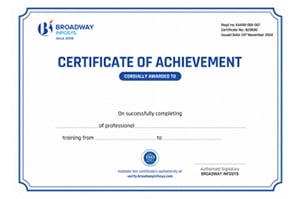Students who got hired learning this course
Hear from graduates who have completed our courses.
MERN Stack Training in Nepal (MongoDB, Express.js, React.js, Node.js) from Broadway Infosys is crucial for those interested in discovering how to create web apps using this stack. The course equips students with the abilities and information necessary to master all facets of MERN Stack programming, including database design, server-side scripting, client-side scripting, and more.
This Stack course gives students practical experience using tools and methods commonly used in the industry, allowing them to create scalable and reliable real-world applications. MERN Stack Development Training presents a beneficial chance for people to advance their careers in web development and gain a competitive advantage in the job market because of the rising demand for MERN Stack developers.
The core objective of this course is to train developers in Nepal to create a proficient experts to work with both back-end and front-end technologies using a single language, JavaScript. Broadway has proven to accomplish in its objectives since its establishment.
Hear from graduates who have completed our courses.

What is the Web?
Evolution of the web from static to dynamic applications.
Differences between websites and web applications.
Web Technologies Overview
HTML, CSS, and JavaScript as the foundational technologies.
Introduction to modern web tools and frameworks
HTML Basics
Understanding semantic tags.
Best practices for accessibility.
Generating html using AI tools (eg. copilot, chatGPT, etc)
CSS Basics
Styling elements, box model, and positioning.
Responsive Web Design Tools
Introduction to media queries and flexible grids.
Tools like Figma for design prototyping.
Introduction to TailwindCSS
Benefits of utility-first CSS.
Tailwind setup and usage.
Customizing Tailwind configurations.
JavaScript Essentials
Event handling, DOM traversal, and manipulation.
Understanding asynchronous operations (callbacks, promises).
Add this credential to your LinkedIn profile, resume, or CV to stand out to recruiters.
